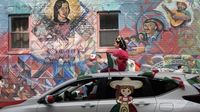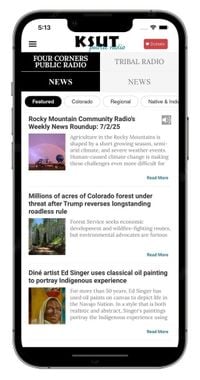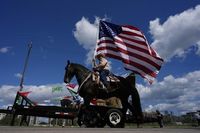Music, color, and the unmistakable sound of celebration filled the streets of Chicago’s Pilsen neighborhood on Saturday, September 6, 2025, as residents gathered for the annual Mexican Independence Day parade. Yet, beneath the surface of festivity, an unmistakable sense of anxiety pulsed through the crowd—a tension fueled by President Donald Trump’s threats to dispatch National Guard troops and ramp up immigration enforcement in the city.
According to FOX32 Chicago, the parade stepped off at noon on 18th Street at Newberry Avenue, just as it has for the past 24 years. Local businesses and community leaders, after much deliberation, agreed to press forward with the event. "Everybody decided to continue celebrations," Rigoberto Gonzalez Jr., executive director of the United Merchants of Pilsen Chamber of Commerce, told the station. For many, the parade was more than just a party—it was a declaration of resilience. "Community, tradition and culture" were, in Gonzalez’s words, at the heart of the decision to carry on.
But this year, the parade looked and felt different. As CNN described, crowds were smaller, and the usual exuberance was tempered by precaution. Bright orange whistles dangled from the necks of dancers and parade-goers, ready to be blown as a warning if federal immigration agents appeared. Volunteers handed out flyers outside the Lozano Branch of the Chicago Public Library, reading, "Blow the whistle on ICE!"—a nonviolent tactic aimed at raising the alarm should enforcement agents arrive.
"My heart is like pounding a little bit because I don’t know what to expect today," Magdalena Alvarado, a 30-year resident of Little Village, told Associated Press. She clutched an orange whistle, prepared for the worst but determined to celebrate nonetheless. Spectators waved monarch butterfly signs—a nod to migration—and drivers of vintage cars honked their horns while dancers in feathered costumes marched proudly down the street. "At these hours you should be able to see plenty of people in the streets enjoying themselves, but now there’s not really a lot of people," Claudia Alvarez remarked to AP as she watched her daughter ride by on horseback.
The parade in Pilsen was not alone in facing these uncertain times. Just a few miles away, Little Village prepared for its own 54th annual Mexican Independence Day Parade, scheduled for Sunday, September 14. Organizers there, too, refused to let fear dictate their traditions. "For more than five decades this parade has shown pride, the strength, the resilience of our community," Jennifer Aguilar, executive director of the Little Village Chamber of Commerce, told NBC Chicago. In anticipation of possible immigration raids, security was ramped up. Organizers worked closely with rapid response teams and immigration lawyers, ready to offer assistance on-site if needed.
Still, the specter of federal enforcement loomed large. According to AP, President Trump had made his intentions clear, posting an image on Truth Social depicting himself against a Chicago skyline ablaze with flames and helicopters. "Chicago about to find out why it’s called the Department of WAR," he wrote, alluding to his executive order to rebrand the Department of Defense. The president further declared, "I love the smell of deportations in the morning," echoing the infamous line from the film Apocalypse Now.
Local leaders were quick to condemn what they saw as an unprecedented federal overreach. Illinois Governor JB Pritzker responded on social media, stating, "The President of the United States is threatening to go to war with an American city. Illinois won’t be intimidated by a wannabe dictator." Chicago Mayor Brandon Johnson signed an order the previous weekend, affirming that city police would not collaborate with federal agents on civil immigration enforcement. Johnson publicly urged residents to look out for one another, emphasizing the city’s commitment to its immigrant communities.
Despite these assurances, the fear was palpable. Community groups distributed flyers throughout the city, reminding residents of their rights: the right to remain silent, the right to refuse searches, and the right not to disclose their birthplace or citizenship status. As CNN reported, even schoolchildren were not immune to the anxiety. Sylvelia Pittman, a teacher at Nash Elementary, recounted how her students said goodbye on Friday, worried they might not see each other the following week.
Not all celebrations were able to withstand the climate of uncertainty. The Latino Heritage Festival in Wauconda was canceled, with the police department citing "the recent weather situation and immigration concerns." In Waukegan, just north of the Great Lakes Naval Base—now rumored to serve as a command center for incoming immigration agents—the city’s Mexican Independence Day parade was postponed for the first time in its 30-year history. The El Grito Chicago festival, a two-day downtown event, was also put on hold. "We’re saddened about the loss of an opportunity to uplift a vision of dignity, strength, and belonging at a time when it’s sorely needed," organizers said in a statement to CNN.
Those who did attend the Pilsen parade did so with a sense of duty as much as celebration. "It’s always a good moment to celebrate our culture, our customs," Araceli Lucio, a longtime resident, told CNN. "I think now more than ever is when we need to demonstrate that we are united and we are a community." Others, like Liliana Scales, echoed the sentiment of perseverance: "We’re here. We’re not going away. No matter what generation, no matter what threat, no matter what president is in office, we’re not going away," she told NPR.
But the reality of living under threat was never far from mind. Andrea Soria, a 27-year-old Pilsen resident, spoke to NPR through tears about her undocumented family members who had not left their homes all week, relying on her for groceries and errands. The stress, she said, was overwhelming.
As the weekend’s events unfolded, protesters took to downtown Chicago’s streets, chanting, "No hate. No fear. Immigrants are welcome here," according to NPR. Among them was Kevin Ryan, a Marine veteran, who carried a sign reading, "Veterans demand no troops on our streets." He explained, "The military is not trained to police. It’s a violation of federal law, and it’s unconstitutional. And it’s dangerous." The protest, dubbed "No Trump, No Troops," was organized by groups like Indivisible and "Hands Off Chicago," ready to rally the city should federal agents or troops arrive.
Even as celebrations continued in some neighborhoods, the economic toll was felt. Fabio Fernandez, a local business owner in Pilsen, told AP that anxiety had translated into lower sales and fewer customers. "Come back to 18th Street. Support small businesses here. They’re still working hard as hell to keep their businesses alive," he urged.
For many, the week’s events were a stark reminder of how quickly joy can be overshadowed by fear—and how community can become both a shield and a rallying cry. As Alejandro Vences, a new U.S. citizen, put it, "For us, our Independence Day has always been a celebration of our culture. It’s always been a celebration of who we are. It feels like we don’t get to celebrate our culture in the same way."
Through parades, protests, and quiet acts of solidarity, Chicago’s Mexican American community made it clear: their traditions endure, even when the times are uncertain and the stakes feel impossibly high.



